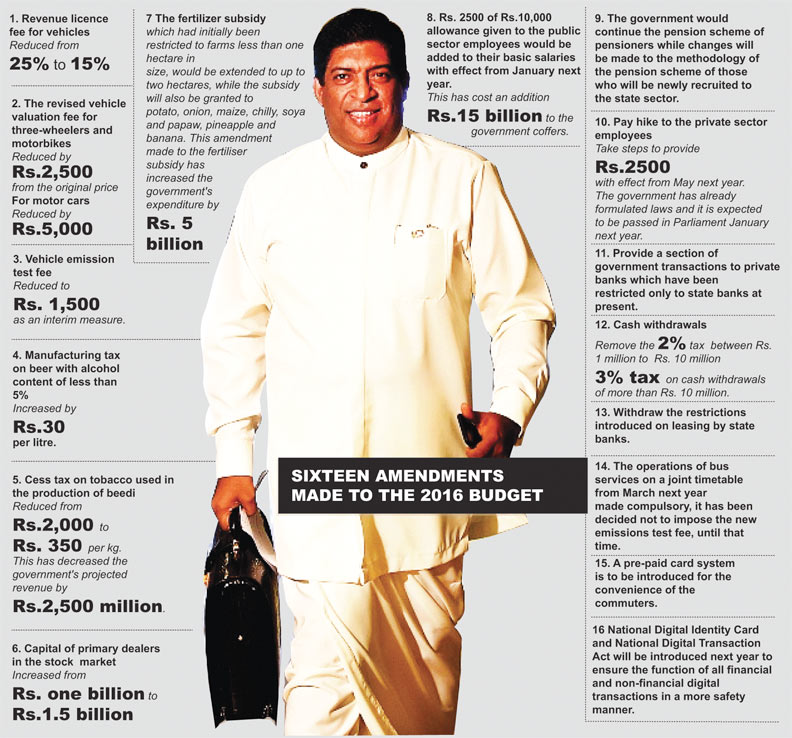Budget 2016: From promise to compromise
By Uditha Kumarasinghe
The Third Reading of Budget 2016 was passed after 16 of its revenue
proposals were amended in compliance with the call made by Opposition
political parties and trade unions. This would go down in the annals of
the country as the first time a government had bowed to the wishes of
the people signaling its strong affinity and commitment towards
upholding democratic norms.
Winding up of the Third Reading of the Budget debate, Finance
Minister Ravi Karunanayake said government expenditure for next year
could exceed Rs. 35.5 billion as a result of the amendments.
The sixteen amendments to the Budget are:
1. Revenue licence fee for vehicles reduced from 25 percent to 15
percent.
2. Revised vehicle valuation fee for three-wheelers and motorbikes
reduced by Rs.2, 500, while the valuation fee for motor cars has been
reduced by Rs.5,000.
3. Vehicle emission test fee reduced to Rs. 1,500 as an interim
measure.
4. Manufacturing tax on beer with an alcohol content of less than
five percent has been increased by Rs.30 rupees per litre.
5. Cess on tobacco used in the production of beedi has been decreased
from Rs.2,000 to Rs. 350 per kg. This has decreased the government's
projected revenue by Rs.2,500 million.
6. The capital requirements of primary dealers in the stock market
has been increased from Rs. one billion to Rs.1.5 billion.
7. The fertilizer subsidy, which had initially been restricted to
farms less than one hectare in size, will be extended to up to two
hectares, while the subsidy will also be granted to potato, onion,
maize, chilly, soya and papaw, pineapple and banana growers. This
amendment to the fertilizer subsidy has increased government expenditure
by Rs. 5 billion.
8. Rs. 2,500 of the Rs.10,000 allowance to public sector employees
will be added to their basic salaries from January. This has cost the
government an additional Rs.15 billion.
9. The government would continue the pension scheme for pensioners
while changes will be made to the methodology of the pension scheme for
those newly recruited to the State sector.
10. Steps will be taken to provide a Rs.2,500 pay hike to private
sector employees from May next year. The government has already
formulated laws and it is expected to be passed in Parliament in
January.
11. Provide a part of government transactions to private banks which
has been restricted only to State banks at present.
12. Remove the 2 percent tax on cash withdrawals between Rs. 1-10
million and 3 percent tax on cash withdrawals of more than Rs. 10
million.
13. Withdraw the restrictions introduced on leasing by State banks.
14. Operations of bus services on a joint timetable from March next
year has been made compulsory and the new emission test fee will not be
imposed until such time.
15. A pre-paid card system will be introduced for the convenience of
commuters.
16. The National Digital Identity Card and National Digital
Transaction Act will be introduced next year to ensure the function of
all financial and non-financial digital transactions safely.
Finance Minister Karunanayake said before making these 16 amendments,
the government's projected revenue for next year was Rs.2,005 billion
and total expenditure was Rs. 3,389 billion while the Budget deficit was
Rs. 649 billion.
However, the amendments made to the Budget have increased the
government's expenditure by Rs.35.5 billion. The government hopes to
minimize the expenditure by bridging the gap between savings and
revenue. Rs. 4 billion is expected to be saved through the management of
fuel and transport expenditure while the money allocated to expedite the
digitalization program has been suspended saving Rs. 3,000 million.
“We are trying to capitalize undercapitalized banks. Through the
increase of manufacturing tax on beer the government hopes to raise
Rs.500 million,” the Finance Minister said.
Meanwhile, Finance Ministry Secretary Dr. R.H.S. Samaratunga told the
Sunday Observer that the government will not slash any of the projects
due to the additional expenditure of Rs.35.5 billion as a result of the
amendments.
Usually projects start on the first of January each year. Each
project has to show progress. Some work goes on as scheduled while some
work may be delayed. These things may happen when a development project
is implemented. However, the Finance Ministry is able to manage these
things.
Dr. Samaratunga said it would not be difficult to adjust money as
some of the projects would naturally not progress at the expected rate.
It would only be a reallocation of funds. Sometimes, the completion of
the projects may get delayed. However, there are some savings in certain
areas. The Ministry is aware about the projects which are slow.
The vote on the Third Reading of the maiden Budget of the National
Unity Government was passed by a majority of 109 votes in Parliament on
December 19 and 160 MPs voted in favour of the Budget while 51 voted
against.
Thirteen MPs including former President Mahinda Rajapaksa were absent
at the time of voting. The JVP and the UPFA rebel MPs who call
themselves the ‘Joint Opposition’ voted against while the UNP, TNA, UPFA
members in the Government, SLMC, CWC and EPDP voted for the Budget.
 |

